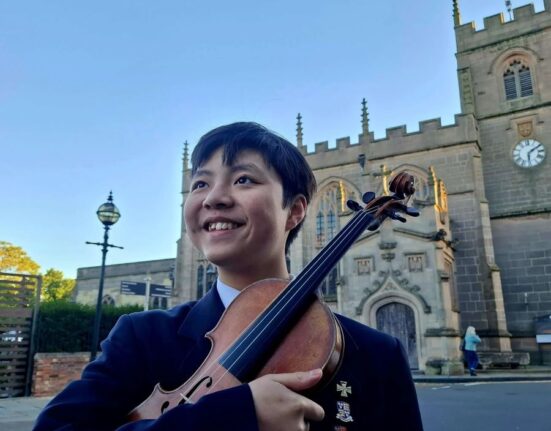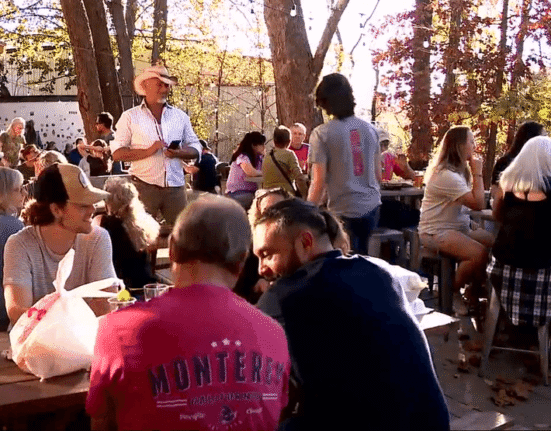AFRICA: MUSICIAN and producer Verckys Kiamuangana Mateta, founder of the Vévé label has left an indelible mark in the African rhumba music and the world in general.
From Luambo Luanzo Makiadi ‘Franco’ to Kabasele Yampanya ‘Pepe Kalle’, including Trio Madjesi and Zaiko Langa Langa, Verckys worked with all the big names in rhumba. breathed his last on October 13, 2022 aged 78 years.
It was upon discovering the orchestra that entertained the evenings at a bar belonging to his father, in the interior of the country, that Mateta, later known as Verckys, developed a passion for music.
He was not yet ten years old, but this world fascinated him, and upon returning to Kinshasa, he would have only one idea in mind: to become a musician.
The Kimbanguist brass band offered him his first initiation, and the famous Isaac Musekiwa would soon introduce the young man to the saxophone.
While his father wanted to send him to study in Europe, he ran away and went into hiding elsewhere in Kinshasa, in the commune of Matete, and chose a stage name, Verckys, after that of an American saxophonist of the time.
He played in several small local groups, such as Conga Jazz with Dewayon and Johnny Bokelo, or the Los Cantina orchestra.
Applying to OK Jazz, Franco judged him too young to hire him but seeing him in town playing in Gerard Kazembe’s orchestra, he changed his mind and Verckys joined the orchestra which was already an institution, and competed with African Jazz for the public’s favor.
“In OK Jazz, Verckys plays the sax of course – we hear him in a magnificent dialogue with Franco on the song ‘Course au pouvoir ‘, but he also composes songs like ‘Madame de la Maison’. He acknowledged, however, in an interview with Radio Centraal available on the mbokamosika website, that his songs did not have the same success as those of the boss: “Franco had the secret of the depth of the songs, he was truly the great master”, he says in the same interview.
He sang about the living things that exist, the social life of the Congolese. To make a good song, you have to know how to listen to the moods of the masses, and tell the history of the population”.
Above all, during the five years he spent at OK, Verckys became Franco’s private secretary, accompanying him on trips, carrying his briefcases, a sort of aide-de-camp who earned nothing or almost nothing, but learned a lot. Not just about how to write songs, but also about managing an orchestra and making music a business.
In fact, this is what would precipitate Verckys’ dismissal. The ambitious young man recovered some studio equipment and secretly recorded a few tracks of his own, with some of the members of OK Jazz. During a trip with Franco to Brussels, Verckys transported the tapes, still in secret.
There, they recorded for Decca with Franco, who claimed that the pay would come later. Verckys, who did not want to return empty-handed, ran away on the day of departure and, having stolen Franco’s contacts, went to entrust his tapes to a publisher, and received a nice advance, with which he would buy two cars.
It was there that Franco discovered the truth and, after conducting his investigation, fired Verckys from OK Jazz (the saxophonist learned of this through the press). But the man, a jack-ofall-trades, is resourceful.
He who, when OK Jazz went to play in Brazzaville, filled trunks with soap and oil to resell them, has – just like Franco – a flair for business.
He buys used instruments from Roger Izeidi (half in cash, half on credit) and recruits young musicians to found the Vévé orchestra – his nickname, a memory of one of his lovers who called him Vévé chéri. And at the same time, founds Vévé Editions to produce and market his music.
The Orchestre de la maison, founded in 1969, will become a breeding ground for many Zairian artists, including the dynamic trio that will first make him famous, formed by Mario (Matidi Mabele), Djeskain (Loko Masengo) and Sinatra (Saak Saakul).
The three broke away in 1972 to found, taking the first two letters of each of their stage names, the trio Ma-Dje-Si.
Within the Vévé orchestra, the scope for experimentation is vast, and the repertoire includes – in addition to Afro-Cuban and the more typical rumba – experiments that venture into soul, rhythm and blues and draw from the infinite field of traditional music of the country.
It is also with the Vévé orchestra that Verckys released one of his most famous songs, whose title carries all the questioning: ‘Nakomitunaka’, meaning ‘I ask myself the question’. It earned him excommunication.
“God, I ask myself the question I wonder where does the black man come from? Who are our first ancestors? Where does injustice come from? Why is Jesus, the son of God, white? Adam and Eve are white.
ALSO READ: Enjoy Bongo Flava as it goes back to music root
All the saints are white, but why? Why do we believe the prophets of white people, when white people don’t believe our prophets, the blacks? But Verckys wasn’t satisfied with that.
In the same interview with Franck Wouters, he recounted how he had found “a very precious raw material,” the exact nature of which he preferred to keep secret, which he had resold in Italy—or rather, exchanged for a large quantity of high-performance musical equipment.
A treasure that allowed him to entrust them to groups, in exchange for exclusivity on the recordings for four years (after which the instruments became the property of the orchestra).
His career as a producer was launched, and, from Zaiko Langa Langa to Pepe Kalle’s Bakuba empire, many would pass through Verckys’s direction.
He even managed to get himself elected president of UMUZA (the Zairian Musicians’ Union), against the advice of Franco, who refused to allow a junior to be above him (especially since Franco had understood his former protégé’s knack for business).
But the producer and musician managed to calm him down by officially naming him—along with Jeff Kalle—Grand Master of Congolese Music.
An honorary title that placed him above all else. Verckys would later also become president of the Congolese copyright society, a highly coveted position of influence disputed by Jossart Nyoka Longo, with whom the dispute was still pending before the courts.
The Vévé catalog had been reissued by Sterns in 2015, and the Analog Africa label had dedicated a superb compilation to him.
“He is the last of the Musketeers, after Franco and Rochereau,” explains José Nzolani, author of the book ‘Learning Lingala through Rumba’. Verckys has done everything that can be done in modern Congolese music.
As a musician, playing the sax, guitar, organ, etc., but also as a publisher, producer, conductor, manager, talent scout, etc. He was the one who encouraged a young lyricist to take up singing: a certain Koffi Olomidé. Let’s bet that in heaven, the deans of rumba have just welcomed one of their own.
And that, from Wendo to Tabu Ley, including Franco and Papa Wemba, there, up there, with Verckys on sax, is the most powerful of rumba orchestras. Verckys was the son of a prosperous Congolese businessman, who first came to prominence as a member of the famed O.K. Jazz.
He had mastered the flute and clarinet early in life and graduated to saxophone while playing in a combo at a church run by followers of Congolese prophet Simon Kimbangu.
While still a teenager, he made his professional debut in Paul Dewayon Ebengo’s Conga Jazz, then moved up to O.K. Jazz in 1963. Verckys played an energetic sax, tinged with American rhythm and blues.
His volatile solos, although generally uncredited on the records, distinguished the band’s midsixties period and earned Verckys the accolade ‘man with lungs of steel’. Personal life and death Verckys was a father to 12 children.
Of these, four were with his legal wife Lucie Bola, four with Christine Juster who died a year before, two with Stéphanie Feza who also died in 1998 and two with Kiriza kondoli. In November 2007, Le Potentiel reported that Verckys was in poor health, noting his reliance on a walking cane.
Following the death of fellow musician Madilu System in August 2007, Tabu Ley Rochereau publicly appealed for government assistance on Verckys’s behalf, citing his declining condition.
In response, the Minister of Culture and Arts, Marcel Malenso Ndodila, allocated funds to facilitate Verckys’s transfer to Belgium for medical treatment. After several attempts to secure a visa, he was eventually able to travel to Belgium for care.
Kiamuangana died on 13 October 2022 in Kinshasa at the age of 78. His funeral, held on 19 December 2022, was a major national event.
Prior to burial, his remains were displayed at both the National Museum of the Democratic Republic of the Congo and the esplanade of the People’s Palace, allowing the public to pay their respects. He was laid to rest at the ‘Entre Terre et Ciel’ cemetery in Kinshasa.
During the official funeral ceremony, President Félix Tshisekedi posthumously awarded him the Order of the National Heroes Kabila-Lumumba.
The ceremony was marked by military honors and a gathering of dignitaries, including government ministers, parliamentarians, cultural figures, artists, and members of the general public.
The Minister of Culture, Arts and Heritage, Catherine Furaha, delivered an eulogy on behalf of the government, celebrating Verckys as a towering figure in Congolese music.
She highlighted his versatile legacy—specifically noting his pioneering role as the first African of his era to own and operate a record label, Éditions Vévé.
She credited him with significantly shaping Congolese rumba and promoting African music on the international stage. His hit song ‘Nakomitunaka’ was cited as an example of his philosophical depth and cultural influence.









Leave feedback about this